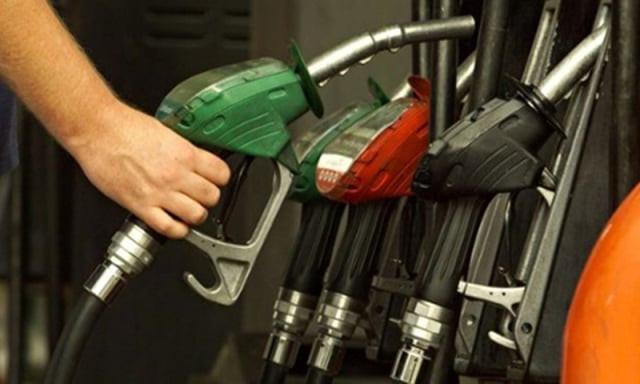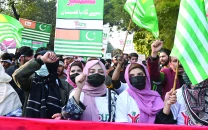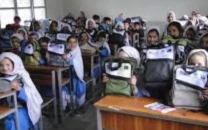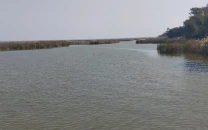Oil prices kept level for March
Two months ago, the government had increased the sales tax rate on oil prices first to 22% and then to 27%

Two months ago, the government had increased the sales tax rate on oil prices first to 22% and then to 27%. PHOTO: REUTERS
The Oil and Gas Regulatory Authority (Ogra) recommended increasing the prices of four petroleum products and reducing the prices of HSD rate for next month, said Finance Minister Ishaq Dar while addressing a news conference in Islamabad. The government typically lets Ogra’s recommendations take effect, but this month, the finance ministry appears to have chosen a path that would maximise government tax collection, a decision that Dar attributed to Prime Minister Nawaz Sharif.
The tax rates on four oil products – petrol, light diesel, kerosene, and high-octane blended component (HOBC) – will be reduced from the elevated levels of 27% down to 18%, which is still higher than the 17% charged on most other goods and services. This reduction in taxes on these products would keep their prices level, despite an increase in global oil prices.
Two months ago, the government had increased the sales tax rate on oil prices first to 22% and then to 27%, aimed at preventing a decline in government revenues as a result of a decline in global oil prices. The measure was taken through an administrative Statutory Regulatory Order (SRO), meaning without the consent of Parliament, causing uproar in the National Assembly. Dar had promised Parliament that the rates would be brought back down when oil prices started going back up. The opposition has boycotted National Assembly sessions over what they deem to be an “unconstitutional move”. Dar maintained that the changes in sales tax rates were constitutional and all legal formalities will be met by Saturday (today) before the oil prices go into effect.
When asked if the rates would be brought back down to 17%, Dar was noncommittal, saying that the government would only absorb a price increase through tax rate reductions in March 2015, following which all global fluctuations would be passed on to consumers.
Meanwhile, while the rates on other oil products were decreased, the sales tax rate on HSD was increased to 37% in order to keep prices at an average of Rs80.61 per litre. Without the rate increase, the rate would have decreased to Rs75.12, in line with Ogra’s recommendations. High speed diesel is the most consumed oil in the country, utilised as the primary fuel in agriculture and transportation.
Dar claimed that Ogra had proposed to increase petrol prices by 7.9% or Rs5.59 per litre to Rs75.88, but prices will remain at the current level of Rs70.29 per litre. For kerosene, prices were proposed to be raised by 11.9% or Rs7.32 per litre to Rs68.76. For HOBC, prices were set to have gone up by 15.7% or Rs12.62 per litre, but will remain unchanged at Rs80.31 per litre. Light diesel prices were proposed to go up by 9.4% or Rs5.50 per litre to Rs63.44.
By keeping these prices level, Dar claimed that the government was also taking a hit on the petroleum levy (an additional tax paid by consumers on oil products) in the range of Rs0.18 to Rs5.11 per litre on these four items.
However, the finance minister hinted that this would not be the last time the government changed tax rates to meet its revenue targets and that Islamabad may take further such actions if tax revenues keep coming in below even the downward revised targets.
Off the anti-money laundering ‘grey list’
Dar also announced that the United Nations Financial Action Task Force (FATF) in its plenary held in Paris removed Pakistan from its ‘grey list’, certifying that Pakistan’s anti-money laundering and counter-terrorism financing laws were no longer deficient compared to global standards.
The FATF – the international body which sets standards for anti-money laundering (AML) and countering terrorism financing (CFT) – placed Pakistan on its grey list in February 2012, which meant that the country was not fully compliant with the standards set by FATF.
Dar welcomed the FATF decision, crediting the Nawaz Administration’s efforts over the past 21 months, including passing new legislation that would meet global requirements. Equally important, Pakistan also met the concerns of Asia Pacific Regional Review Group (AP-RRG) on enforcement actions against the UN-designated terrorist entities. Financial institutions have also been prohibited from providing any financial services to such entities and associated individuals.
As a result of this decision, Pakistan is no longer subject to FATF’s monitoring process under its ongoing global AML and CFT compliance process. The FATF plenary took the decision on a report compiled by AP-RRG that visited Pakistan in December.
“India, which is also member of the regional review group, did not attend the meetings that were held in Pakistan,” said Dar.
Published in The Express Tribune, February 28th, 2015.



















COMMENTS
Comments are moderated and generally will be posted if they are on-topic and not abusive.
For more information, please see our Comments FAQ